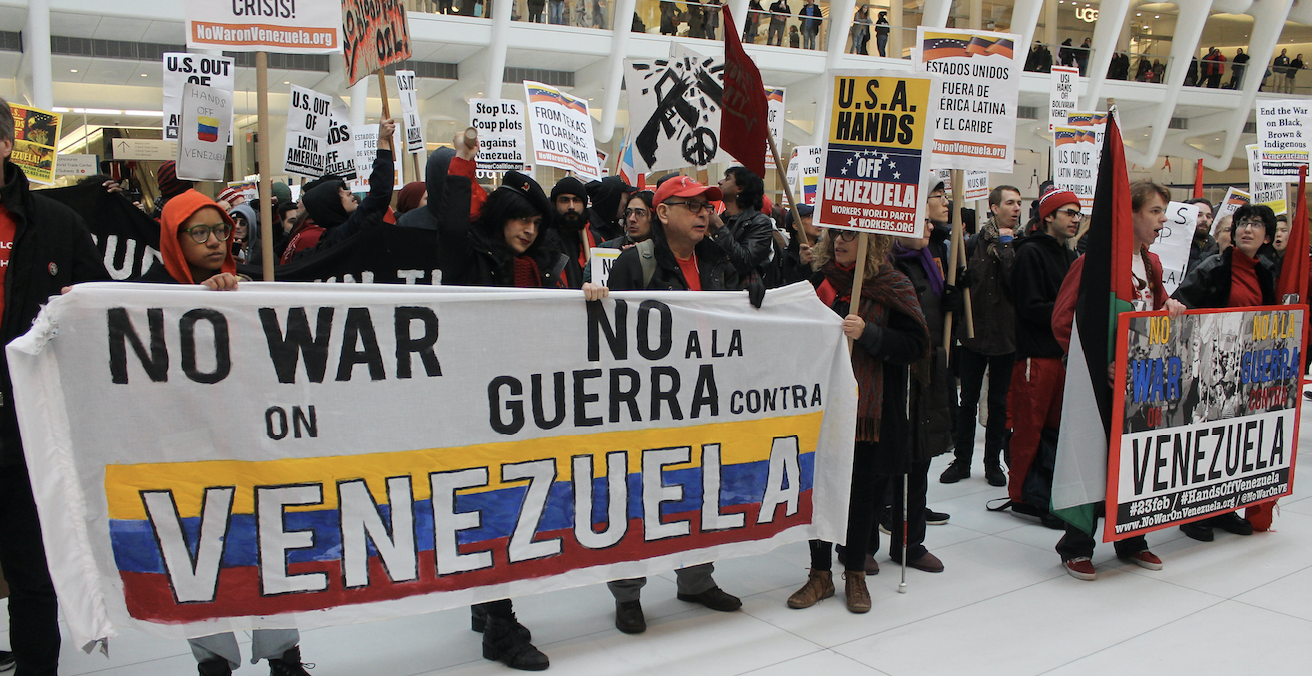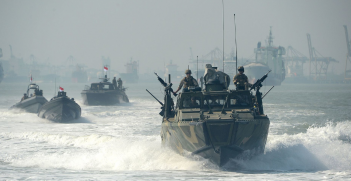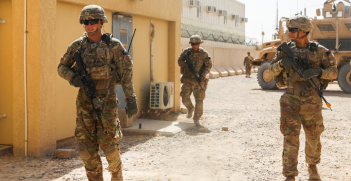What the Global Left is Getting Wrong on Venezuela

Elements of the global left have contested Western recognition of the opposition leader Juan Guaidó as Venezuela’s interim president. However, their reasons for opposing the move are misguided and will place them on the wrong side of history.
The Trump administration’s decision to recognise the leader of Venezuela’s National Assembly, Juan Guaidó, as Interim President, has proved to be polarising. While most Latin American countries, Australia, Canada and the European Parliament have followed Trump’s lead, China, Turkey and Russia have stood by the embattled Nicolás Maduro.
So have a variety of public intellectuals and leaders in the West. Notable examples include Jeremy Corbyn – a long-time supporter of Maduro’s predecessor Hugo Chávez – and a group of 70 scholars including Noam Chomsky and former UN rapporteur on Venezuela, Alfred de Zayas.
Being wary of US intervention is justified. Washington’s dismal track record of supporting unsavoury coups in Latin America and links to the ill-fated Venezuelan coup of 2002, clearly provide reasons for pause. The 2002 coup attempt was particularly egregious, given that Chávez – unlike Maduro – had a degree of democratic legitimacy and presided over a functioning country.
However, Maduro’s supporters on the left make a series of misguided claims and neglect the possibility that despite Washington’s questionable motives, it could at least inadvertently be on the right side of history. Three of the most spurious claims made by the global left are outlined below.
1. The actions of the international community amount to a “coup” attempt
At face value and in isolation, this claim made by the 70 notable scholars and others, appears to make sense. However, when Maduro and his predecessor’s systematic campaign to undermine democracy are examined, a different picture emerges.
Although Chávez did win a series of democratic elections, he began the country’s slide into a dictatorship by stacking the Supreme Court and muzzling freedom of speech. However, the most severe declines have occurred since 2013, when Maduro took office after Chávez’s death.
When the recession of 2014 hit, a series of protest movements rocked the country, peaking in 2016 and 2017. With approval ratings of around 20 percent, Maduro’s reaction to the protests was to use violence and to dissolve the opposition-held legislative branch in March 2017.
While the Supreme Court later reversed this decision in the wake of more protests, Maduro remained undeterred, holding two rigged elections since this time – the 2017 constituent assembly elections designed to redraw the 1999 constitution and the 2018 presidential elections. Neither of these elections gained international recognition as legitimate.
Since 2014, Maduro has also stacked the electoral commission, harassed critical media and civil society and, more ominously, had his forces accused of the rape, torture and killing of political opponents. Notably, previous rounds of government-opposition talks have failed, with questions being asked over the willingness of both sides – particularly the government – to negotiate in good faith.
In recognising Guaidó – the leader of the country’s last democratically elected institution – as interim leader before free elections are held, the actions of the international community look more like an attempt to bolster the opposition against a government which has systematically undermined democracy and who has little support, rather than a “coup.”
In calling for “negotiations” whilst simultaneously decrying any foreign interference, the group of 70 scholars are echoing a tried and tested formula which will only perpetuate the manifestly undemocratic status quo.
2. US sanctions are primarily to blame for Venezuela’s woes
Since the collapse in global oil prices in 2014, Venezuela has suffered astronomical inflation – which the IMF predicts will reach 10 million percent this year – causing three million people to exit the country as basic necessities become unaffordable and hospitals cease to function.
However, responsibility for this crisis remains hotly contested. Oil price collapse is not wholly to blame as other countries dependent on oil exports have not fared nearly as badly. Some – seemingly including the 70 academics who only briefly allude to Maduro’s mismanagement – blame the crisis mostly on US sanctions.
Books have been written about the causes of Venezuela’s economic crisis, but a few factors are worth noting.
Oil comprises up to 98 percent of the country’s export earnings, but production has been at record lows because of systemic mismanagement. During his time in office, Chávez sowed the seeds of the current crisis by stacking the state-owned PDVSA oil company with political appointments at the expense of actual expertise, as well as siphoning off billions of the company’s revenue to fund social projects.
This meant the company lacked the expertise, revenue and equipment needed to maintain production levels. With production so low, Caracas is in severe debt and lacks the foreign currency which it relies upon to buy basic necessities. Moreover, while Chávez’s social projects reduced poverty, they robbed the country of the chance to shock-proof the economy by investing in alternative industries or building up foreign currency reserves.
Maduro’s approach to dealing with the crisis has only exacerbated matters. To service the country’s ever-growing debt, Maduro has mostly resorted to simply printing more money, leading to even more inflation. Maduro has also maintained Caracas’s notorious currency-exchange system first instituted under Chávez.
Under the system, the local bolivar currency is pegged to the greenback at artificially high rates. This not only hurts local exporters by overvaluing the bolivar, but it also incentivises corruption. Only a select few have access to the exchange system, but a black market where dollars are sold at higher rates flourishes. Regime insiders estimate up to $300 billion has been stolen through this scheme.
Certainly, US sanctions have exacerbated the humanitarian crisis by restricting the ability of the Venezuelan government to access loans. But to blame the economic crisis primarily on US sanctions – appears fantastical.
3. The principle of “national sovereignty” must be defended
The academics round off their letter by appealing to the principle of “national sovereignty” which has also been invoked by Maduro and his supporters. This invocation comes against the backdrop of disastrous Western military interventions in Iraq and Libya.
Yet, to hold this principle as sacrosanct is dangerous. The point of upholding state sovereignty is to avoid disastrous interventions which result in only failed states, poverty and human rights abuses. Arguably, however, Venezuela on almost any measure is already such a state.
While calls in Washington for military intervention appear premature and irresponsible at this stage, they are in the minority. Instead, targeted sanctions, diplomatic pressure and secret talks with the military are the favoured course of action. By calling for the defence of national sovereignty, those on the left are only serving the interests of Maduro and his corrupt cronies – with Xi and Putin as bedfellows to boot.
Henry Storey is completing a Masters in International Relations at the University of Melbourne. He is a Middle East North Africa analyst at Foreign Brief and was previously the Australian foreign policy fellow at Young Australians in International Affairs.
This article is published under a Creative Commons License and may be republished with attribution.





